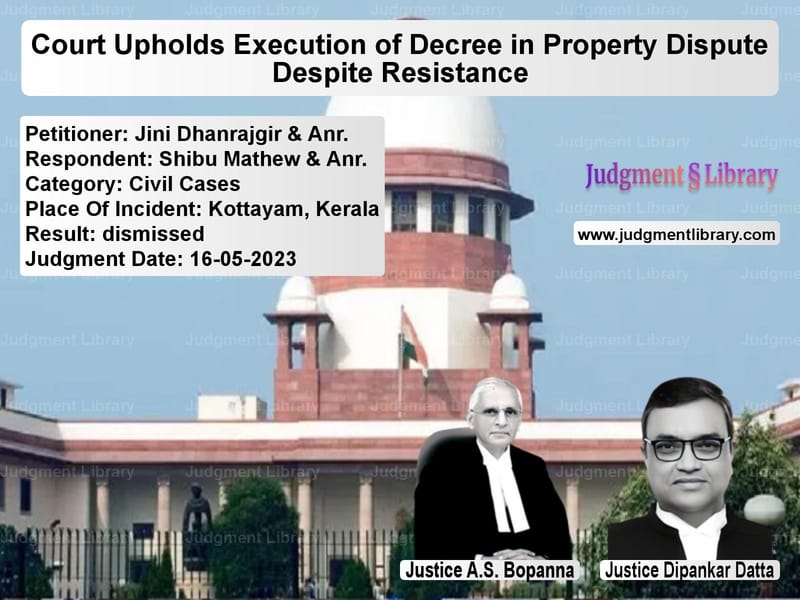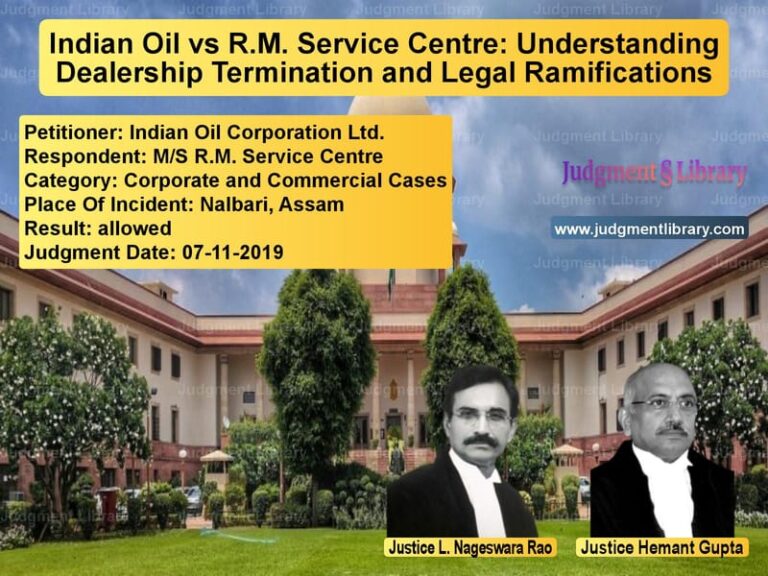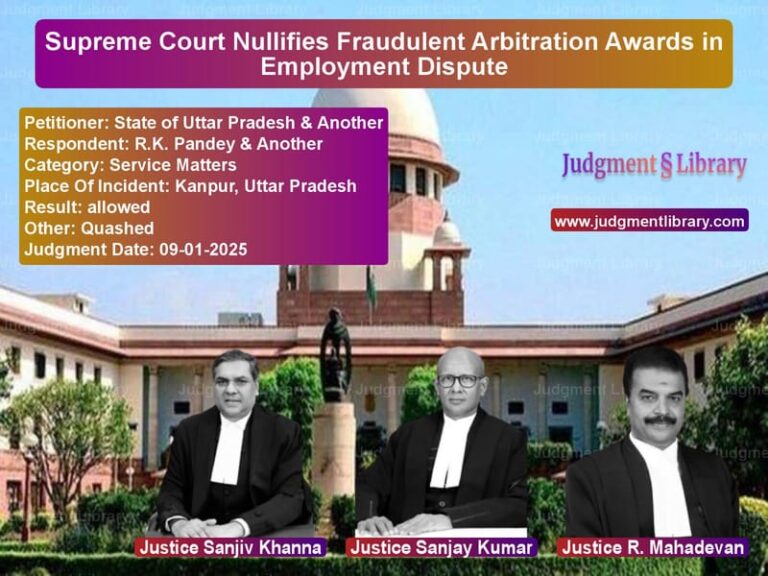Court Upholds Execution of Decree in Property Dispute Despite Resistance
The case of Jini Dhanrajgir & Anr. vs. Shibu Mathew & Anr. revolves around a protracted legal battle involving the execution of a decree regarding the ownership and possession of a disputed property. The Supreme Court was called upon to adjudicate whether objections raised by third parties, including pendente lite transferees, could prevent the execution of the decree passed by the trial court and upheld by the High Court. The Court upheld the executing court’s decision, emphasizing the importance of executing judgments promptly and without undue delay caused by resistance or obstruction by third parties.
Background of the Case
The dispute traces back to a property dispute in Kottayam, Kerala, where the appellants, Jini Dhanrajgir and her brother, sought the recovery of their property that was allegedly wrongfully occupied by the respondents. The case originally began with a suit filed by their mother, Mrs. Tara Cherian, against Mr. V.T. Mathew, his sons Mr. Thomas and Mr. Abraham, and others. The case concerned a piece of land in Nattakom Village, Kottayam, which had been the subject of a complex property dispute involving claims of ownership, tenancy, and unauthorized possession.
Throughout the years, the case saw various legal proceedings, and after many twists and turns, the trial court issued a decree in favor of Mrs. Cherian on 21st October 2000, directing the respondents to hand over possession of the disputed property to her. However, despite this, the respondents continued to resist the delivery of possession, citing various objections related to their rights over the land. The issue escalated when the appellants sought the enforcement of the decree.
Objections Raised by Respondents
During the execution proceedings, the respondents raised multiple objections, arguing that they had obtained purchase certificates for parts of the disputed property from the Land Tribunal under the Kerala Land Reforms Act (KLR Act). These objections were filed after the execution proceedings had commenced, asserting that the respondents had independent title to the property and were not bound by the decree. The appellants, on the other hand, contended that these objections were baseless, and the respondents had no legal right to resist the decree.
The appellants filed a petition before the High Court under Article 227 of the Constitution of India, which directed the executing court to address the objections raised by the respondents. The appellants argued that the respondents had no title to the disputed land and that they were acting in willful disobedience of the decree.
Petitioner’s Arguments (Jini Dhanrajgir & Anr.)
Senior counsel for the appellants, Mr. Diwan, made the following points:
- The Respondents had no title to the property as they had never contested the proceedings before the trial court.
- Their objections based on the purchase certificates obtained from the Land Tribunal were frivolous and should not be entertained by the executing court.
- The objections raised by the Respondents were merely an attempt to delay the execution of the decree, which had been upheld by the High Court.
- As per Section 52 of the Transfer of Property Act, the transfers made during the pendency of the suit were invalid, as they were affected by the doctrine of lis pendens.
- The respondents were attempting to defeat the lawful decree by offering resistance and should be ordered to vacate the premises.
Respondent’s Arguments (Shibu Mathew & Anr.)
The counsel for the respondents, Mr. Chitambaresh, made the following counter-arguments:
- The appellants had failed to challenge the Purchase Certificates issued by the Land Tribunal, which conferred legal title upon the respondents.
- The respondents had been tenants of the disputed property and had obtained legal ownership as per the provisions of the Kerala Land Reforms Act, 1963.
- As per the Cheeranthoodika Ahmmedkutty ruling, the Court must give due weight to the unchallenged purchase certificates.
- The appellants’ conduct in directly approaching the Supreme Court without utilizing the proper appellate remedies under Article 227 or revisional jurisdiction was inappropriate.
- The respondents’ rights were independent of the judgment-debtor, and they had a legal right to contest the execution.
Supreme Court’s Observations
The Supreme Court reviewed the case in its entirety and made the following observations:
- The executing court has the authority to determine whether third-party claims are valid in execution proceedings. The resistance raised by the respondents must be examined by the executing court under the provisions of Order XXI Rules 97, 98, and 102 of the Civil Procedure Code (CPC).
- Once a decree is passed, the decree-holder is entitled to seek its enforcement, and any resistance must be examined by the court, particularly when the resistance is based on a claim of title by a third party.
- In cases where the respondents raise objections based on purchase certificates or claims of title, these objections must be examined by the executing court on their own merits.
- The fact that the appellants had deposited the compensation amount as directed by the Supreme Court in 2014 does not justify the delay in the delivery of possession.
- While Rule 102 of Order XXI of the CPC limits the applicability of Rules 97 and 100 when the resistance arises from third-party transferees, the Court found that the objections here warranted further investigation.
Key Judgment Excerpt
The Supreme Court held:
“The Executing Court must adjudicate the objections raised by the respondents based on their legal standing, including the validity of the transfer documents they present. The mere filing of an objection does not preclude the Court from continuing the execution of the decree unless there is a substantiated claim for ownership.”
Further, the Court observed:
“The doctrine of lis pendens applies to transactions that occur during the pendency of the suit, and any sale of property made during such a time will be subject to the final judgment rendered by the court. Therefore, the respondents cannot claim ownership through a transfer that occurred during the pendency of the dispute.”
Final Verdict
The Supreme Court dismissed the appeal and upheld the decision of the High Court. The Court issued the following directions:
- The objections raised by the respondents must be adjudicated on their merits by the Executing Court.
- The Respondents should be removed from the disputed property only after the completion of the legal process.
- The execution of the decree will proceed without undue delay, but the issue of title must be conclusively determined by the Executing Court.
- The appellants should pursue their claim through the appropriate judicial channels to resolve the objections raised by the respondents.
This judgment serves as a reminder of the importance of maintaining the integrity of judicial processes in property disputes and reaffirms the rights of decree-holders while allowing fair adjudication of third-party claims in execution proceedings.
Petitioner Name: Jini Dhanrajgir & Anr..Respondent Name: Shibu Mathew & Anr..Judgment By: Justice A.S. Bopanna, Justice Dipankar Datta.Place Of Incident: Kottayam, Kerala.Judgment Date: 16-05-2023.
Don’t miss out on the full details! Download the complete judgment in PDF format below and gain valuable insights instantly!
Download Judgment: jini-dhanrajgir-&-an-vs-shibu-mathew-&-anr.-supreme-court-of-india-judgment-dated-16-05-2023.pdf
Directly Download Judgment: Directly download this Judgment
See all petitions in Property Disputes
See all petitions in Damages and Compensation
See all petitions in Landlord-Tenant Disputes
See all petitions in Judgment by A. S. Bopanna
See all petitions in Judgment by Dipankar Datta
See all petitions in dismissed
See all petitions in supreme court of India judgments May 2023
See all petitions in 2023 judgments
See all posts in Civil Cases Category
See all allowed petitions in Civil Cases Category
See all Dismissed petitions in Civil Cases Category
See all partially allowed petitions in Civil Cases Category







